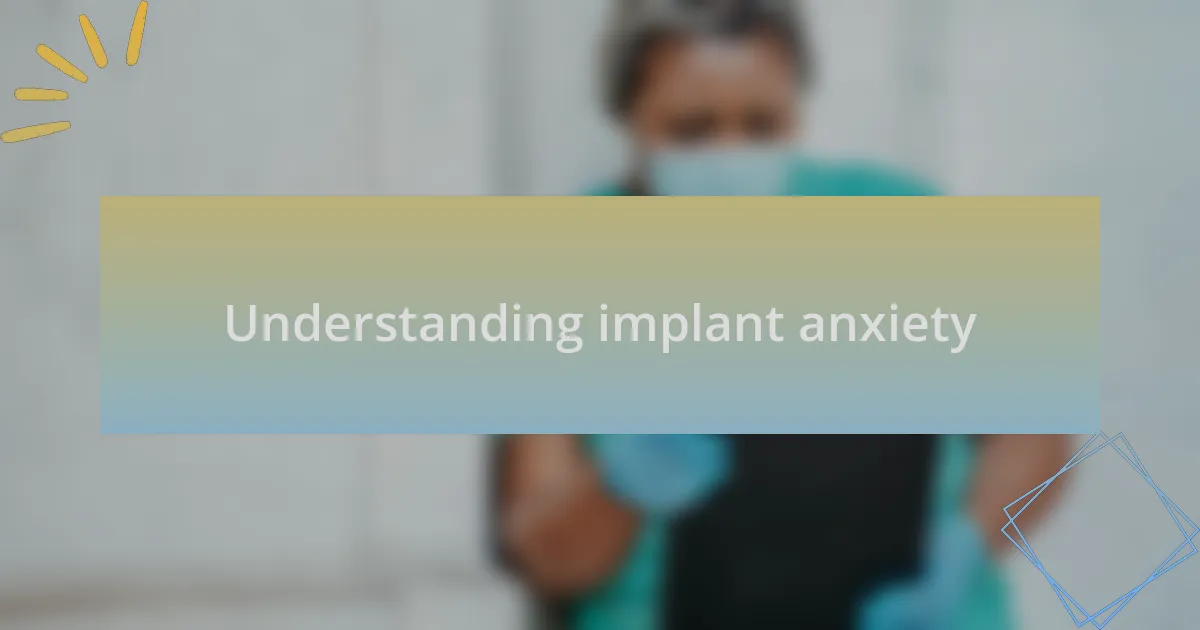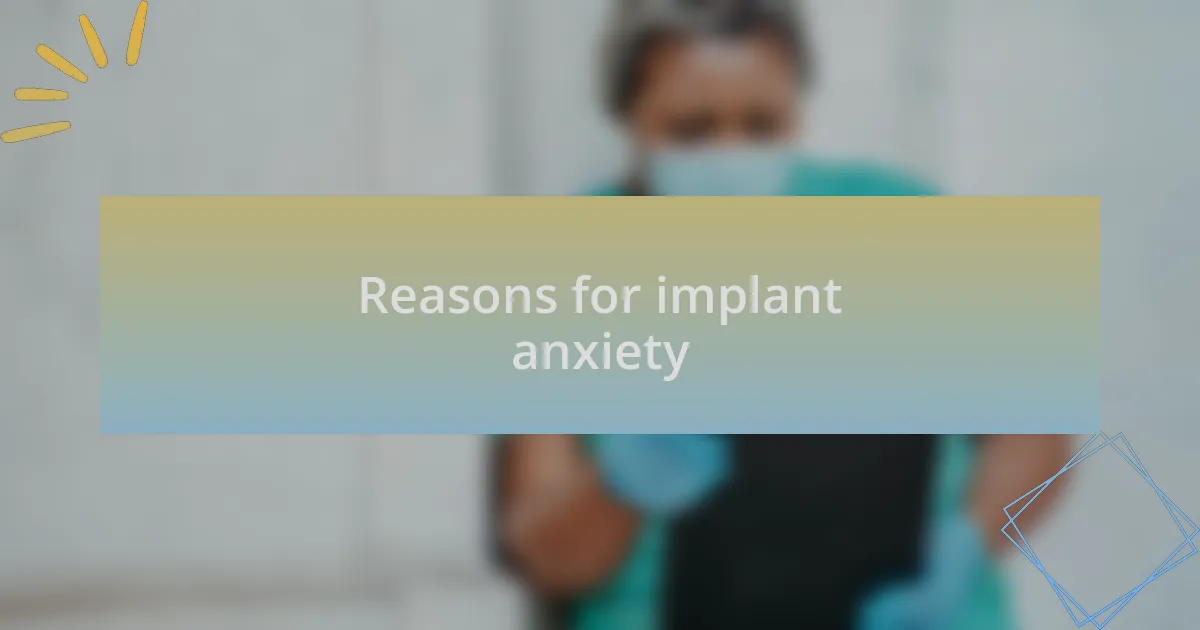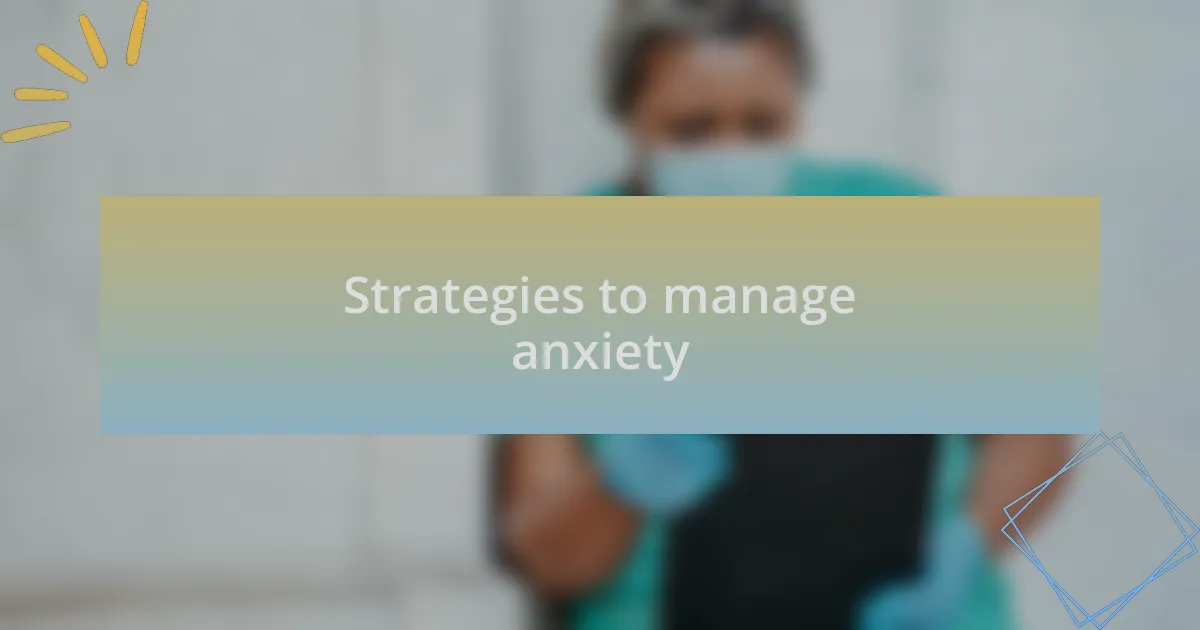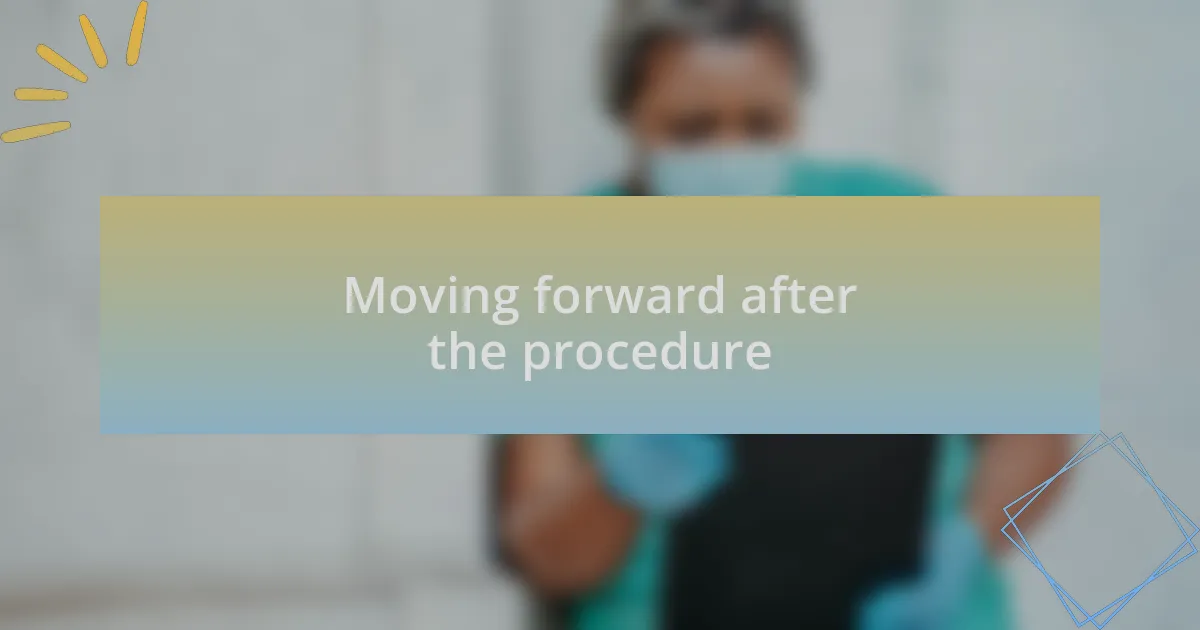Key takeaways:
- Implant anxiety often arises from fears of pain, lack of information, and feeling out of control during dental visits.
- Effective communication with dentists, including asking questions and establishing rapport, can significantly alleviate anxiety.
- Mindfulness, visualization, and seeking support from loved ones are effective strategies to manage dental anxiety.
- Post-procedure healing involves a mix of emotions, and connecting with a community can provide reassurance during recovery.

Understanding implant anxiety
Implant anxiety can often stem from a fear of the unknown. I remember my own worries before getting dental implants—thoughts raced through my mind: What would it feel like? Would it hurt? These questions can create a significant emotional burden, making it crucial to address them openly.
For many, the thought of dental procedures brings up feelings of vulnerability and helplessness. I often found myself imagining the worst-case scenarios during my visits to the clinic. This emotional rollercoaster is common. Have you ever caught yourself spiraling into negative “what if” scenarios? Acknowledging these feelings is the first step toward overcoming them.
Understanding implant anxiety also means recognizing its physical manifestations. I felt my heart race and palms sweat when I sat in the dental chair. This visceral reaction can deter individuals from seeking vital care. It’s essential to note that these feelings are valid and shared by many, creating a sense of camaraderie in facing what seems daunting.

Reasons for implant anxiety
Thinking back to my own experiences, I realize that one major reason for implant anxiety is the fear of pain. The idea of a procedure that involves surgery can be overwhelming. I used to envision the worst kind of discomfort and struggled with the thought of whether my experience would match those vivid imaginings.
Another factor that contributed to my anxiety was a lack of information. Before my appointment, I found myself worrying about what the process would entail—how long it would take, what recovery might look like, and if there would be any complications. I remember seeking reassurance but often left with more questions than answers. Have you ever faced a situation where clarity made all the difference? I know it did for me.
Additionally, feeling out of control during dental visits added to my unease. I find myself in a chair, unable to see what’s happening, which can trigger a sense of vulnerability. Sometimes, I felt as if I was at the mercy of the procedure and the dental team. Acknowledging these feelings was key for me, reminding myself that it’s okay to feel anxious; it’s a natural human response to challenging situations.

Importance of communication with dentists
Effective communication with dentists can significantly alleviate anxiety surrounding dental implants. I remember my first visit, feeling like I was entering the unknown. Once I voiced my concerns, my dentist took the time to explain each step of the process in detail. This transparency helped me transform fear into understanding.
I also discovered that asking questions played a crucial role in easing my worries. One day, I asked my dentist about pain management options. The moment he detailed the approaches available, it felt like a huge weight lifted off my shoulders. Do you ever feel more at ease when you know your options? I certainly did, and it empowered me to approach my procedure with more confidence.
Moreover, establishing rapport with my dentist made all the difference in my experience. When I shared my previous fears, I felt genuinely heard and reassured. Having a compassionate professional listen to my worries not only fostered trust but also created an environment where I felt safe to express my anxiety. Doesn’t it feel great when someone truly understands what you’re going through? For me, that connection was invaluable.

Strategies to manage anxiety
Finding strategies to manage anxiety can be a game-changer for anyone preparing for dental implants. For me, practicing mindfulness became crucial. Before each appointment, I would spend a few minutes focusing on my breath and grounding myself. This simple technique helped me center my thoughts and diminish those racing worries that often accompany dental visits. Have you tried this? It’s amazing how a little mindfulness can create a sense of calm.
Another approach that worked wonders for me was visualization. I remember sitting in the waiting room, and instead of fixating on what was about to happen, I imagined myself successfully going through the procedure and feeling relief afterward. This mental rehearsal shifted my focus from dread to positivity, making the experience much more manageable. Have you ever pictured an outcome and found it easier to handle? It definitely changed my perspective.
Lastly, I found that bringing a friend or family member along made a noticeable impact. Sharing the experience with someone I trusted helped me feel less isolated in my anxiety. On one particular visit, my sister held my hand and offered reassuring words, which made me realize that I didn’t have to face my fears alone. Isn’t it incredible how the support of loved ones can lighten the emotional load? That companionship provided the comfort I needed to push through my anxiety.

Techniques that helped me
A technique that significantly reduced my anxiety was creating a playlist of calming music. On days leading up to my appointment, I would listen to soothing tracks while preparing. The right music can transport your mind to a more peaceful place. Have you ever lost track of time just by immersing yourself in sound? It truly has a powerful effect.
Moreover, I found journaling to be an invaluable tool. Before my surgery, I wrote down my fears and then countered each one with a rational thought. This exercise not only helped in articulating my emotions but also offered me a clearer perspective on what was realistic and what was just fear talking. Isn’t it interesting how writing can untangle your thoughts and clarify your feelings? I felt lighter and more in control after each session.
Finally, I embraced the idea of seeking information. I spent time researching dental implants, which ultimately carved away a lot of my anxiety. Understanding the procedure’s steps and what to expect made it feel less daunting. Have you ever noticed how knowledge can demystify a situation? It turned uncertainty into a sense of preparedness for me, transforming fear into confidence.

Moving forward after the procedure
After the procedure, I found that the healing process can bring a mix of emotions, from excitement to nervousness about the outcome. I remember staring at my reflection, wondering if the implants would truly feel like a part of me. It was a moment filled with anticipation; have you ever felt that blend of hope and uncertainty?
As days turned to weeks, I learned the importance of patience. There were moments when I doubted if everything was healing correctly, and I had to remind myself that good things take time. I often turned to online forums to connect with others who shared similar experiences. Did you know that finding a community can be incredibly reassuring? Hearing others share their triumphs made my own journey feel less solitary and more like a collective experience.
Gradually, as I resumed my normal activities, I discovered a newfound appreciation for my smile. It wasn’t just about aesthetics; it was about confidence. Each time I laughed without hesitation, I was reminded of how far I had come on this journey. Wasn’t it surprising to realize how crucial our smiles are to our self-esteem? Embracing this change not only helped me move forward but also deepened my self-love in ways I hadn’t anticipated.